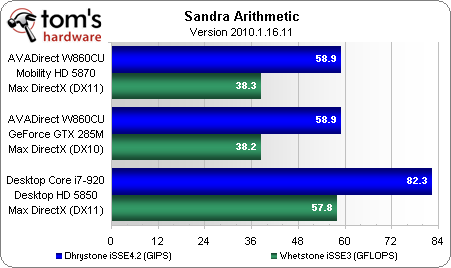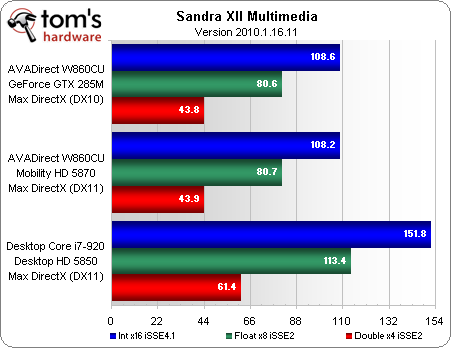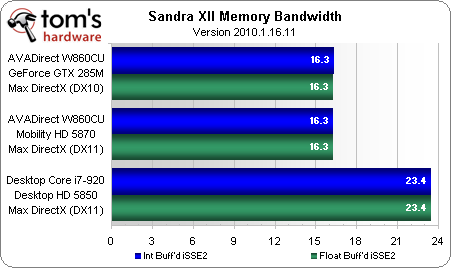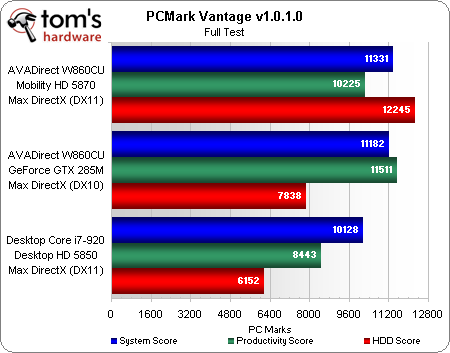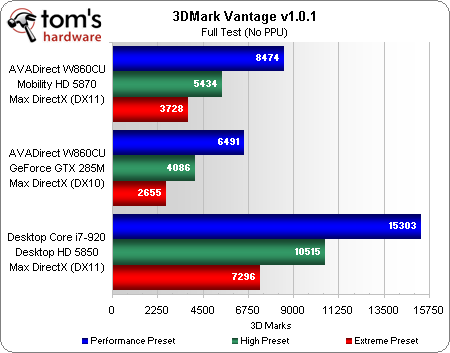AVADirect's W860CU: Mobility Radeon HD 5870 Vs. GeForce GTX 285M
Custom system builder AVADirect is one of the few companies to offer the flexibility of multiple graphics modules within the same notebook model. We used its high-end W860CU to compare AMD's and Nvidia's highest-performance mobile graphics processors.
Bencmark Results: Synthetics
We wouldn’t expect to see any noticeable difference in CPU or memory performance between two systems that differ only in graphics, yet enthusiasts looking to break away from the desk will be interested to see how much performance must be sacrificed.
Synthetic benchmarks represent the “worst case” for the mobile CPU, since these benchmarks are multi-threaded and optimized for Intel’s quad-core devices. That’s because Intel Turbo Boost doesn’t work as aggressively when all four cores are occupied and the mobile processors have a lower standard frequency. As stated on the previous page, more optimistic turbo multipliers for the mobile processors allow them to frequency-match the desktop part whenever fewer processing threads are in use.
A 35% lower clock speed gives way to a performance loss of around 40% for the mobile CPU in this fully threaded benchmark. Our real-world benchmarks have shown that many applications are poorly threaded, though the industry is advancing.
The desktop platform also has a triple-channel memory controller, yet once again we remind readers that our real-world benchmarks have not previously shown a significant benefit in applications.
PCMark results are influenced by the fact that AVADirect uses high-performance solid-state disks. Our current application benchmark set has not shown more than the slightest preference for the lower seek times that these devices provide, but in the real-world, booting Windows and loading the levels in your favorite games will happen faster.
3DMark shows some inconsistency, though a look at its GPU results (not shown) confirm that a desktop Radeon HD 5850 is twice as powerful as a Mobility Radeon HD 5870.
Get Tom's Hardware's best news and in-depth reviews, straight to your inbox.
Current page: Bencmark Results: Synthetics
Prev Page Test System Configuration Next Page Benchmark Results: Encoding-
ta152h I'm a little confused why you'd choose an i7 920 to compare with a different platform, but maybe it's because I don't know the mobile platform that well.Reply
But, if it's like the P55, which it seems to be, there's the added uncertainty of the architecture thrown in.
Particularly with PCI-E being implemented differently, you might be seeing the inferior implementation of the P55 architecture responsible for a small amount of the relatively poor mobile performance. Since this implementation needs to multiplex the memory bus of the processor, you can run into situations where there is contention.
I doubt it's significant, but I'm curious why you wouldn't want to make a comparison with a more similar desktop platform. Was it because you couldn't get an unlocked Lynnfield to get the clock speeds for the processors the same in Turbo mode?
-
This doesn't make much sense to me... if a 5870M chip = roughly a 5770 desktop chip and a 285M = roughly an 8800gts.. why is it not completely spanking it? we all know 5770>8800.. by a rather large margin! what could be the cause of this?Reply
-
anamaniac Tom's, you should show your power usage results to AMD and ask for an explanation, on why a lower rated part is using more power.Reply
Granted, with a 45W CPU and 50W GPU, 30 mins is expected on a 40W battery if fully stressed. -
jkeopka I liked this article because I found it so darn relevant... I actually have this same Clevo Laptop, with the 5870 and 8 gigs of RAM.Reply
The GTX 285M was a $50 premium over the 5870, and I am glad I chose to stick to the 5870. It is kind of strange one would pay more to have less performance. I guess thats what fanboyism are all about? -
jkeopka anamaniacHow many partners use Clevo laptops and just rebrand them?Lots. Mine is a Sager 8690... which is a rebranded Clevo W860CU...Reply
I have seen this model at other sites as well. -
falchard Looks more like a bottleneck then anything conclusive. The results in nearly all the tests were close, yet 1 of them should have been clearly ahead.Reply
I think an ASUS JH73-A1 verse this would have been more interesting as its a bit cheaper for better parts. -
Crashman TA152HI'm a little confused why you'd choose an i7 920 to compare with a different platformSame speeds in Turbo mode, which is used during games, the primary focus being gaming performance.TA152HBut, if it's like the P55, which it seems to be, there's the added uncertainty of the architecture thrown in.That's true, but neither graphics solution provided the performance needed to highlight the mobile processor's on-die PCIe controller's performance advantage.TA152HI'm curious why you wouldn't want to make a comparison with a more similar desktop platform. Was it because you couldn't get an unlocked Lynnfield to get the clock speeds for the processors the same in Turbo mode? Exactly. Besides, Tom's Hardware has already seen that clock-for-clock, Lynfield games at least as well as Bloomfield when a single card is used. If nothing else, the comparison favors the mobile solution's lower power consumption.Reply
